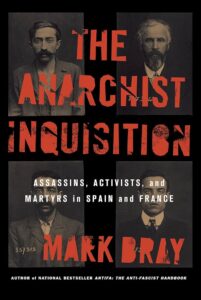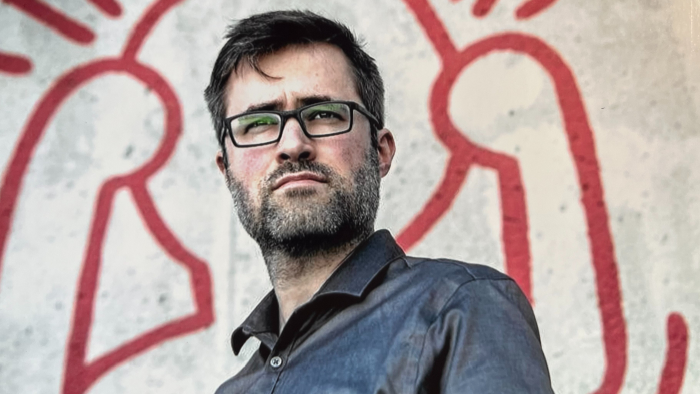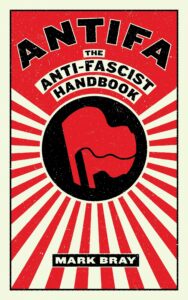Mark Bray, Historian of Antifascism Exiled to Spain: “All Left-Wing Protest is Being Demonized.”
Targeted by the far right, Rutgers historian Mark Bray and his family went into exile in October. Speaking with The Volunteer from Madrid, he reflects on the current political situation. “Fascism shamelessly takes over institutions that, under liberal norms, are supposed to remain neutral.”
“I don’t know what’s going on, but it seems your reservations have been canceled,” said the Newark Airport flight attendant one Wednesday in October, as historian Mark Bray was about to board a flight to Madrid with his wife and two young children. Bray, who teaches the history of the left at Rutgers, knew immediately that it wasn’t a mistake. Someone did not want him to leave the country.
The day before, he and his family had decided to leave the United States because they no longer felt safe. On October 2, Bray had become the target of an aggressive harassment campaign by far-right groups that not only demanded his university fire him but also published his home address and threatened to kill him.
On the very day that his flight reservations were mysteriously canceled, President Trump and his team were meeting at the White House with several far-right influencers who had participated in the harassment campaign. The meeting took place two and a half weeks after Trump, through executive order, declared “Antifa” a “terrorist organization,” and two weeks after the release of a national security memorandum (NSPM-7) linking a “dramatic increase” in left-wing political violence to “anti-Americanism, anti-capitalism, and anti-Christianity.”
Exactly one week later, the organization Turning Point USA (whose founder, Charlie Kirk, was killed in September) branded Mark Bray as “Doctor Antifa,” claimed his presence on campus posed a “threat to conservative students,” accused him of funding the movement, linked him to Kirk’s murder, and launched an online petition demanding his dismissal.
Bray, an expert on the history of anarchism—his most recent book, published in 2023, explains how repressive responses to the rise of anarchism in late 19th-century France and Spain spurred the development of international law and the global human rights movement—is also the author of Antifa: The Anti-Fascist Handbook, based on interviews with activists from around the world. The book’s release in August 2017 coincided with neo-Nazi protests in Charlottesville, Virginia, against the removal of a statue of Confederate general Lee. When Bray defended the right to self-defense against “white supremacist and neo-Nazi violence,” he was accused of inciting violence.
The day after their reservations were canceled, the family managed to fly to Spain, but only after an interrogation by federal agents. Bray spoke to me in October from Madrid.
How do these recent attacks differ from those you faced in 2017?
Things have changed in several ways. Today there is a much more coordinated and strident campaign to fabricate the specter of supposed left-wing political violence and to demonize anyone on the left who protests as a “terrorist,” clearly in order to suppress them. This both reflects the fact that Trump’s second term is very different in character from his first and the aftermath of Charlie Kirk’s murder. Although the accusations are similar to those I received in 2017, today they are part of a state project. That said, this time centrist media outlets are more skeptical of the government’s claims about Antifa. They know perfectly well it’s made-up.
The current government has managed to turn an organization like Turning Point USA into a sort of extension of its surveillance and repression apparatus, violating every kind of protocol and decorum. Vice President J.D. Vance hosted Kirk’s podcast from the White House itself, using it to issue direct threats to supposedly extremist media and foundations.
It’s true that there are unofficial but explicit links between TPUSA chapters at universities, the organization’s national leadership, and right-wing influencers like Jack Posobiec and Andy Ngo—both of whom were at the White House when my airline tickets were canceled. The role Vance took on after Kirk’s death is only part of a broader, fully state-sanctioned response marked by attacks on anyone who dared to criticize Kirk. The violation of protocol you mention is straight out of the fascist playbook—Mussolini did it, too—though unfortunately many Americans don’t realize that. Fascism despises traditional politics and shamelessly takes over institutions that, under liberal norms, are supposed to remain neutral. Ultimately, fascists seek to dismantle the entire liberal project that insists on distinguishing between values and procedures. The Nazis, as we know, tried to create a partisan state by building parallel institutions to the German state. What we’re seeing today in the United States is a project that seems intent on going through the state, turning it into a defender of partisan values, while anyone opposing those values is cast as a terrorist opposition that must be destroyed. None of this bodes well.
You teach at a large public university in New Jersey. Would the situation be different in a state like Texas, where a historian, Tom Alter, was fired simply for identifying as a socialist?
Yes, it would be completely different. I’m lucky not only to be in New Jersey but also at a public university with a strong and progressive union. Otherwise, I would’ve been fired long ago. The faculty, the elected councils, my department, and the union all explicitly support me. Even my more conservative colleagues realize that if we accept a situation where pressure from a handful of students can drive professors to flee, the entire university would collapse.
How do you explain the administration’s obsession with targeting universities? Are we really that dangerous?
I suppose if you had an honest conversation with different members of the administration, they’d give you different answers. The most obvious one, perhaps, is what the polls show: most college-educated people don’t vote Republican. That means attacking universities generates support among the base. The image of the elitist, Marxist professor indoctrinating students is a powerful symbol for stirring up anger among Trump’s followers. But it’s not all just for show. The other day I spoke with a journalist who covers the White House, who told me he has the distinct impression that members of Trump’s team actually believe what they say. That’s important to keep in mind, even if their relationship to truth is different from ours. I used to think it didn’t matter whether they believed what they said or not. But these days I’ve started to frame the question differently: If they truly believe there’s a conspiracy to replace the white race, that Jewish money is manipulating immigrants and Black people to destroy their civilization—what does that imply? It’s certainly a framework capable of accommodating all kinds of fascist and racist garbage. And if they also believe that university professors are at the center of that conspiracy, promoting it, then that explains the ferocity you mentioned. Just read the latest national security memorandum, NSPM-7. It’s all there. Nor can we discount the role of personal resentment from someone like Trump, who has long felt despised by bookworms who think he’s an idiot.
 Before you were able to leave the United States, you were questioned by federal agents. May I ask what they wanted to know?
Before you were able to leave the United States, you were questioned by federal agents. May I ask what they wanted to know?
I can say a few things. I think they were agents from Customs and Homeland Security, but I’m not sure. It was a disorienting experience. When they wanted to take me to a separate room, my small children started crying. The agents first told me they were concerned for my safety and that, if I had any problems in Spain, I should contact the embassy. But then they started asking about the income I’d received from my book—where the money was going. When I told them I wouldn’t continue that line of questioning without a lawyer present, they dropped it. What they did do was search all our belongings and take my phone. Although they returned it shortly afterward, once we arrived in Madrid I bought a new one, just in case.
What did the experience leave you with?
It was strange to feel that the well-being and safety of my family were in the hands of these four goons. I felt powerless. And that’s knowing full well that these situations are far worse for anyone without U.S. citizenship. What shocked me was that they wanted to search and question us even though we hadn’t been accused of anything. In fact, if we’ve made the news, it’s because crimes have been committed against us. To me, what happened at the airport is further proof that, increasingly, U.S. federal agencies couldn’t care less about pretending to be neutral arbiters of the law. In other words, they’ve stopped pretending.
Sebastiaan Faber teaches at Oberlin College. A Spanish version of this interview appeared in CTXT: Contexto y Acción.














